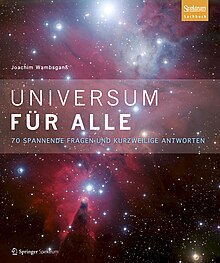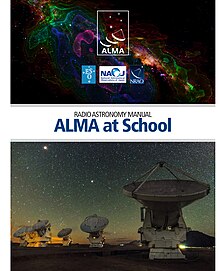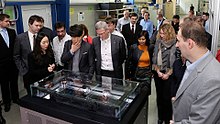Science outreach
This articleneeds additional citations forverification.(January 2023) |
Science outreach,also callededucation and public outreach(EPOorE/PO) or simplypublic outreach,[citation needed]is anumbrella termfor a variety of activities byresearch institutes,universities,and institutions such asscience museums,aimed at promotingpublic awareness (and understanding) of scienceand making informal contributions toscience education.[1]
Scope and history[edit]
While there have always been individual scientists interested in educating the public, science outreach has recently become more organized. For example, the National Aeronautics and Space Administration (NASA) now requires all of its projects to organize suitable outreach activities.[citation needed]Also working to inform the public are organizations such as Communicating Astronomy to the Public[2]and the Washington Declaration on Communicating Astronomy to the Public[3]that organize conferences for the public on science issues and make efforts to put outreach on a more general institutional footing.
Recently, an increasing number of projects have hired designated outreach scientists (part-time or full-time) that handle public relations for their project. There are also specialized outreach providers such as the Education branch of theSpace Science Institute[4]in Boulder, Colorado and theEducation and Public Outreach GroupatSonoma State Universitywhich offer to organize a project's outreach activities on a contractual basis.
In addition to outreach by research institutions, an important part of informal science education are outreach programs such asscience museumsandscience festivals.
Activities[edit]
Science outreach can take on a variety of forms.
Public talks, lectures, and discussions[edit]

Lectures are probably the oldest form of science outreach, dating back to the 1820s whenMichael Faradayorganized the first of theRoyal Institution'sChristmas Lectures.[6]
Public talks can be part of a lecture series, given at ascience festivalor in cooperation with a special interest group such as a localastronomy club.Public presentations can have a variety of formats, including straightforward lecture formats with or withoutexperimental demonstrations,guided live interviews, and discussions with several participants and a moderator. There are also less formal initiatives such asCafé Scientifique,in which a café or bar is the venue for regular meetings involving guest scientists that come to talk about their work or take part in discussions with members of the public, and collaborations with museums[7]
Visiting primary and secondary schools[edit]
School students and teachers are an important target group for science outreach. Outreach activities can include scientists visiting schools, giving talks at assemblies, discussions with students, or participation in events such ascareer fairsand science and technology camps. One organization that focuses on this kind of science outreach isRobogals.Many universities also have science outreach programs that are dedicated to building relationships between high school students, university scientists, andK–12teachers. A few of the most prominent university science outreach programs include Carolina Science Outreach,[8]the Vanderbilt Student Volunteers for Science,[9]the Rockefeller University Science Outreach Program,[10]the Present Your Ph.D. thesis to a 12-Year Old Outreach Project atUniversity of Texas at AustininAustin, Texas,[11]the Present Your PhD graduate organization atBaylor UniversityinWaco, Texas,[12]the Discover STEM Polymer Day[13]and Energy and U[14]at theUniversity of Minnesota,and theStanford UniversityOffice of Science Outreach.[15]UsingCanadaas an example, it has been estimated that with sufficient organization, every classroom from kindergarten through graduation could in practice receive a visit from one or more scientists annually with participation from only 10-15% of the scientific enterprise.[16]Some examples of science outreach programs in Canada include:Let's Talk Science,Actua,The Chemical Institute of Canada,andScience Rendezvous.
Workshops and schools for teachers or students[edit]

Inviting groups of school students to a research institution for a workshop is another popular form of outreach. Formats range from a one-day visit to more involved week-long events such asPerimeter Institute's International Summer School for Young Physicists, a two-week-long program for a total of a hundred Canadian and international students from grade 11.[18]
Another method of science outreach invites school teachers to participate in workshops where they are able to learn effective strategies to engage students in science. This approach was especially embraced by theCanadian Space Agency(CSA) which held an annual "Space Educators" conference up until 2012 to provides teachers with access to resources to educate their students in space-related science.[19]
Supporting science fairs and similar events[edit]

Besides organizing independent events, many outreach organizations sponsor existing events that promote sciences awareness. A notable examples arescience fairs,public scienceevents in which working scientists can participate both as judges and as sponsors of student projects.
Online aggregation of science activities, resources, and programs[edit]
The internet is a rich source of science activities, resources, and programs. For example, research laboratories often maintain educational outreach projects aimed at translating their science into something meaningful for the general public, oftenK–12students, as an effort to increase research broader impacts required by funding agencies such as theNational Science Foundation(NSF).[20]These may include activities using fast-growing plants that exhibit distinctive mutants with uniquephenotypesuseful to teach K–12 students about bothMendelianandmolecular genetics.[21]Some institutions and organizations maintain large[22]or small[23]aggregations of their activity resources,[24]outreach programs,[25]upcoming events calendars,[26]and partnering programs.[27]
Awards[edit]
A number of awards honor commitment to science outreach. Examples include:
- Award for Public Understanding of Science and Technology,American Association for the Advancement of Science[28]
- Descartes Prize for Excellence in Science Communication,European Commission[29]
- Michael Faraday Prizefor communicating science to aUKaudience (Royal Society)
- Communicator award,Deutsche Forschungsgemeinschaft[30]
- Synapse Mentorship Awards, often given for exceptional contributions to science outreach,Canadian Institutes of Health Research[31]
- Nicholson Medal for Human Outreach,American Physical Society[32]
- Charles A. Black Award,for exemplary contributions to public understanding of food and agricultural science
- Kalinga Prizefor popularisation of science is an award given byUNESCOsince 1952 for exceptional skill in presenting scientific ideas to lay people
See also[edit]
- List of Astronomy Outreach Resources in Europe
- Science Communication Observatory
- Science festival
- Science museum
- Scientific literacy
- Physics Outreach
- Popular science
- Public science
References[edit]
- ^Varner, Johanna (2014)."Scientific outreach: toward effective public engagement with biological science".BioScience.64(4): 333–340.doi:10.1093/biosci/biu021.
- ^"Communicating Astronomy to the Public".communicatingastronomy.org.RetrievedOct 17,2022.
- ^"Washington Declaration on Communicating Astronomy to the Public".RetrievedOct 17,2022.
- ^"SSI - Education".spacescience.org.RetrievedOct 17,2022.
- ^"New Book Showcases ESO Images".ESO Announcements.Retrieved3 December2012.
- ^"The RI Christmas Lectures (Royal Institution Website)".rigb.org.RetrievedOct 17,2022.
- ^Duckett, Catherine (2021)."Nights at the museum: integrated arts and microbiology public engagement events enhance understanding of science whilst increasing community diversity and inclusion".Access Microbiology.3(5): 000231.doi:10.1099/acmi.0.000231.PMC8209632.PMID34151182.
- ^"Carolina Science Outreach".
- ^"Vanderbilt Student Volunteers for Science".
- ^"RockEDU: Rockefeller University's Science Outreach Program".rockefeller.edu.RetrievedOct 17,2022.
- ^Clark, Greg (2016)."Science Educational Outreach Programs That Benefit Students and Scientists".PLOS Biology.14(2): e1002368.doi:10.1371/journal.pbio.1002368.PMC4742226.PMID26844991.
- ^"Present Your PhD | Bringing science to you: A guest speaker program connecting graduate students with the community".blogs.baylor.edu.Retrieved2022-03-18.
- ^Ting, Jeffrey M. (2017-11-14)."Polymer Day: Outreach Experiments for High School Students".Journal of Chemical Education.94(11): 1629–1638.Bibcode:2017JChEd..94.1629T.doi:10.1021/acs.jchemed.6b00767.ISSN0021-9584.
- ^DeWilde, Joseph F. (2019-02-28)."Evaluating Large-Scale STEM Outreach Efficacy with a Consistent Theme: Thermodynamics for Elementary School Students".ACS Omega.4(2): 2661–2668.doi:10.1021/acs Omega.8b03156.ISSN2470-1343.PMC6647983.PMID31459501.
- ^"Office of STEM Outreach".oso.stanford.edu.RetrievedOct 17,2022.
- ^Bechara J. Saab,"Engaging the Clutch of the Science Communication Continuum – Shifting Science Outreach into High Gear",Hypothesis,Volume 8, Issue 1 (September 2010)
- ^"ALMA Material for Teachers".Retrieved7 July2015.
- ^"International Summer School for Young Physicists".perimeterinstitute.ca.RetrievedOct 17,2022.
- ^"Canadian Space Agency Educators Resources".2017-07-10.
- ^"Broader Impacts - National Science Foundation".nsf.gov.Retrieved2016-07-11.
 This article incorporates text from this source, which is in thepublic domain.
This article incorporates text from this source, which is in thepublic domain.
- ^"FPsc: genetics, evolution, modern genetic sciences".fpsc.wisc.edu.Retrieved2016-07-11.
- ^"Home | science.wisc.edu | University of Wisconsin–Madison".science.wisc.edu.Retrieved2016-07-11.
- ^"Education and Outreach | Sanford Underground Research Facility".sanfordlab.org.Retrieved2016-07-11.
- ^"Curriculum Modules | Sanford Underground Research Facility".sanfordlab.org.Retrieved2016-07-11.
- ^"Outreach Programs | science.wisc.edu | University of Wisconsin–Madison".science.wisc.edu.Retrieved2016-07-11.
- ^"Science / UW-Madison Events Calendar".today.wisc.edu.Retrieved2016-07-11.
- ^"Science Alliance | science.wisc.edu | University of Wisconsin–Madison".science.wisc.edu.Retrieved2016-07-11.
- ^Award for Public Understanding of Science and Technology,American Association for the Advancement of Science
- ^"CORDIS | European Commission".cordis.europa.eu.RetrievedOct 17,2022.
- ^Communicator award,Deutsche Forschungsgemeinschaft
- ^"Synapse Mentorship Awards".cihr-irsc.gc.ca.RetrievedOct 17,2022.
- ^"Dwight Nicholson Medal for Outreach".aps.org.RetrievedOct 17,2022.
